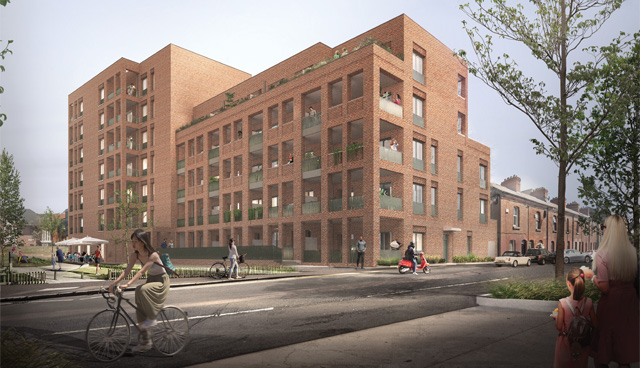
Placemaking for community under Dublin City’s Housing Strategy
22nd July 2020
A holistic approach to housing
22nd July 2020Programme for Government: Outlook for housing

While some have criticised what they perceive to be vague commitments, scant detail and broad continuity with Rebuilding Ireland, others within the housing sector have cautiously welcomed the Programme for Government (PfG) agreed between Fianna Fáil, Fine Gael and the Green Party. Does the document mark a new departure for housing policy or is it more of the same?
Housing was a defining policy area of General Election 2020. This has filtered into the PfG and the words ‘housing’, ‘home’ and ‘homes’ are mentioned 68, 35 and 29 times respectively.
Emphasising the role of the private housing stock, the PfG avows to address the challenges of viability, access to finance, land availability, infrastructure delivery, building standards, quality and regulation, as well as sufficient skilled labour capacity. “We will work with the construction sector to ensure that the number of new build homes continues to grow in the years ahead,” it says.
Five-year housing objectives in the Programme for Government:
- Put affordability at the heart of the housing system.
- Prioritise the increased supply of public, social and affordable homes.
- Progress a State-backed affordable home purchase scheme to promote home ownership.
- Increase the social housing stock by more than 50,000, with an emphasis on new builds.
- Tackle homelessness.
- Ensure local authorities are central to delivering housing.
- Work with the private sector to ensure an appropriate mix and type of housing is provided nationally.
- Improve the supply and affordability of rental accommodation and the security of tenure for renters.
Across a total of seven dedicated pages within the PfG, the ‘Housing for all’ mission makes eight specific objectives for the next five years. However, the detail of some of these, such as “an emphasis” on new builds, remains ambiguous. Likewise, a major criticism of the document is the frequent reference to consideration, examination and review in policy areas rather than explicit commitment to action.
There are eight pillars within the ‘Homes for all’ mission.
- Homelessness
Rather than ‘ending’ homelessness, a “major priority” for the incoming government is “reducing and preventing homelessness”. The PfG commits to collaboration with local authorities and housing agencies to provide long-term accommodation for homeless individuals and families. Specific commitments include: an increase in funding and work with all stakeholders “on a suite of measures” to get rough sleepers off the street; expansion of Housing First with a focus on construction/acquisition of one-bed properties; adequate Rent Supplement and Housing Assistance Payment; the development of a National Youth Homelessness Strategy; the delivery of mental health supports via a HSE funding line; a move away from dormitory accommodation; drug free hostels; continued support for the Housing Agency’s Acquisition Fund; and continued funding of Abhaile. - Affordable home ownership
The PfG has a particular emphasis on affordability and states: “We believe that home ownership should be within reach of all our citizens… An overriding objective of our housing policy is to make homes more affordable.”
The Government has pledged to: promote home ownership through an affordable home purchase scheme; introduce a target for the delivery of affordable homes “as a matter of urgency”; enhance the Serviced Sites Fund; provide local authorities with seed capital to deliver serviced sites at cost; extend the Help to Buy scheme for new properties and self-builds; expand the Rebuilding Ireland Home Loan; consider the expansion of Part V to include affordable purchase/cost rental properties; and augment the Mortgage to Rent scheme. - Public and social housing
Crucially, the PfG indicates an apparent ideological shift from the previous government “to push forward the role of the State to play a greater part in directly providing affordable public and social homes”. Investment in housing and mixed tenure communities is a socio-economic imperative the document contends.
The Government outlines its intention to: increase social housing stock by 50,000 through local authorities, AHBs and state agencies over five years; deliver an appropriate mix of unit variations which can accommodate elderly and disabled people among others; enable local authority discretionary funding to increase by €4 million to €6 million for social housing projects; enhance the role of local authorities’ vacant homes officers; work with AHBs to move off the balance sheet and ease access to finance; introduce social housing reforms meaning that households can move between local authority social housing lists, make it easier for local authorities to retain social housing, standardise the differential rents regime and construct a website for national choice-based letting; as well as ensuring that procurement policy delivers value-for-public-money, has robust social clauses and adheres to new Green Public Procurement policy. - Rental
A further priority specified by the Government is standards, security and affordability for renters. Some of the measures it will introduce to achieve this objective include: developing a cost rental model informed by international experience, including the ‘Vienna model’; considering the introduction of a system to hold rental deposits; transforming the Residential Tenancies Board (RTB) into “an independent and strong” regulator, mandating it to hear deposit dispute cases and increasing RTB inspections and enforcement for short-term and long-term lettings; legislating for tenancies of indefinite duration; incentivising the letting of vacant properties; supporting adequate supply “by ensuring equity and fairness for landlords and tenants”; instructing local authorities to publish a rental needs assessment; and extending the moratorium on evictions in line with the Emergency Measures in the Public Interest (Covid-19) Act 2020. - Land Development Agency
On paper, the Land Development Agency (LDA) model, as envisaged in the PfG appears to be entirely different from that proposed in Land Development Agency Bill 2019. The Government has undertaken a promise to legislate for the creation of the LDA to manage and utilise State land, working with stakeholders to establish strategic urban sites for the sustainable development of social and affordable rent and purchase. All LDA procurement will be subject to oversight and the core objective will be the development of sustainable communities.
The LDA board is set to comprise a cross-section of housing, financial, governance and other independent experts. Crucially, it will be provided with compulsory purchase order (CPO) powers, which are reserved for state bodies (placing it firmly on the balance sheet) and will not be exempt from Freedom of Information requests.
The agency will be mandated to complete an audit of State lands and collaborate with stakeholders to develop masterplans for strategic sites, while ensuring modern methods of construction using local supply chains and being required to report to the Oireachtas with regular updates.
After three years, the Government will review the legislation underpinning the LDA, while, in the meantime, the LDA will automatically retain first refusal on any state lands offered for sale. - Defects and Management Companies
In light of the Safe as Houses report, within the first 12 months of its lifetime, the new Government will “examine the issue of defective housing”, enhance the legal remedies for affected homeowners, fulfil the remediation fund for Pyrite and Mica and assist owners of latent defect properties to access low-cost and long-term finance. Meanwhile, the PfG also promises a review of existing management company legislation to ensure it reflects the best interest of residents. - Planning and reform
The PfG contains a significant number of proposals in relation to planning. Initiatives include introducing “a ‘use it or lose it’ condition” for planning applications exceeding nine units, the examining the creation of a Building Standards Regulator, alignment with the Housing Options for our Ageing Population policy; reforming CPO laws; improving construction skills capacity; robustly enforcing the Vacant Site Levy; and allowing the Strategic Housing Developments planning process to expire at the end of 2021. - Commission on Housing
According to the draft document, a Commission on Housing will be established to review elements of housing provision, including tenure, standards, sustainability and quality of life.
Interestingly, under the heading Constitutional Reform, the PfG states: “We will hold referendums on housing and the extensions of the franchise at presidential elections.” While conspicuously ambiguous, this may allude to a proposed referendum to enshrine the right to housing in the Irish Constitution.
Town Centre First, Retrofit and Age Friendly
Aspects of housing also fall under several other missions contained with the PfG, including ‘A better quality of life for all’, ‘A green new deal’ and ‘Universal healthcare’.
Committing to developing a Town Centre First policy, modelled on a similar scheme in Scotland, the Government will promote residential occupancy in rural towns and villages by regenerating centres though the utilisation of existing properties and unused land. Core to this is the proposed provision of seed capital to local authorities to provide serviced sites at cost, enabling home building.
“On housing we have ensured that home ownership will now be central to the new government’s housing strategy… This housing plan is radical and bold and has the capacity to transform our country for the greater good. It will be the largest state investment in housing in generations, led by Fianna Fáil.” — Housing Minister Darragh O’Brien TD
At the same time, the built environment will contribute to overall climate action. The Government is committed to “an ambitious retrofitting programme” to increase energy efficiency and reduce emissions. This National Retrofitting Plan is intended to act as a component of economic stimulus within the National Economic Plan. It aims to upgrade 500,000 homes to a B2 energy rating by 2030, utilising economies of scale through single area-based schemes and financed by a loan guarantee scheme and “easy pay back mechanisms”.
Finally, the commitment to “An age friendly Ireland” includes a recognition of the relationship between healthcare and housing options. The PfG recognises that a choice of living in appropriate housing, where possible, enables elderly people to remain in close proximity to their families and community while accessing health and social care.
“The Programme for Government commits to affordable, high quality housing and promises to develop a cost rental model to create affordable, sustainable options for those living in rented accommodation on a long-term basis. The Housing Alliance very much welcomes this commitment.” — Declan Dunne, Chair of the Housing Alliance
Committing to an increase in choice of housing options and community supports, the Government pledges to: embed ‘ageing in place’ options in the planning system; achieve a better understanding of housing options for older people; provide an increased number of smaller homes in developments; retain the Housing Adaptation Grant Scheme; prioritise the elderly in climate action plans; and promote greater social interaction to mitigate social isolation.
Reaction
Sinn Féin’s housing spokesman Eoin Ó Broin TD is scathing in his analysis of the housing element of the PfG.
“Fianna Fáil and Fine Gael have had years to come up with an affordable housing plan, and yet in today’s document there are no targets, there are no costings; in fact, there is no plan. Equally, there’s no additional social housing provided for above the existing commitments of the National Development Plan.
“That means homelessness and housing need are set to continue. And on that crucial issue of homelessness, while there is talk of more action, there are no specifics, there is no extra funding and there is no real commitment to bringing homelessness to an end. It gives me great regret to say that if this is the basis for the future government, then the housing crisis is set to continue into the future,” Ó Broin asserts.
“Fianna Fáil and Fine Gael have had years to come up with an affordable housing plan, and yet in today’s document there are no targets, there are no costings; in fact, there is no plan.” — Eoin Ó Broin TD
Meanwhile, the Housing Alliance, a partnership between six of Ireland’s largest AHBs (Circle Voluntary Housing, Clúid Housing, Co-operative Housing Ireland, Oaklee Housing, Respond and Tuath Housing), welcomed the document’s commitment to delivering an increase in affordable rental housing stock and facilitating an ease of access to private finance for AHBs.
Declan Dunne, Chair of the Housing Alliance stated: “The Programme for Government commits to affordable, high quality housing and promises to develop a cost rental model to create affordable, sustainable options for those living in rented accommodation on a long-term basis. The Housing Alliance very much welcomes this commitment.
“AHBs have a key role to play in the development and delivery of such a scheme, drawing on our decades of experience in delivering quality and tailored social housing. We have the proven track record, expertise and capacity to build and manage social and affordable homes. We are extremely encouraged by the commitment to ensuring AHBs will be moved off the State’s balance sheet… Off-balance sheet status means AHBs will be able to access private finance without it being classified as public borrowing, thereby securing best value for the State.”



